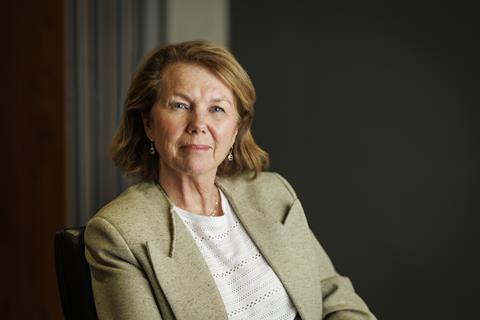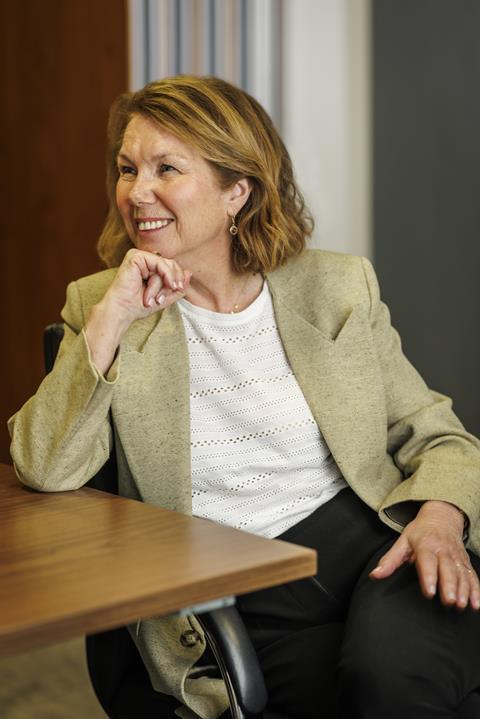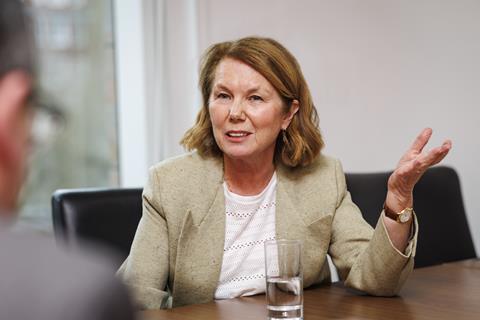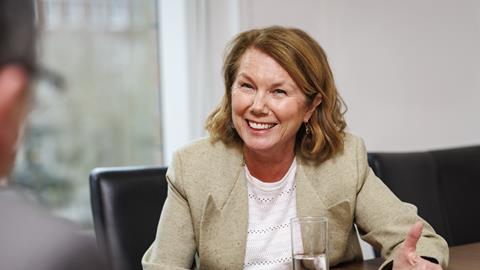Alison Eddy headed Irwin Mitchell’s London office for 12 years. She talks to Eduardo Reyes about a career that has never lost its focus on equality and diversity
BIOG
Born
Cardiff
Education
- Whitchurch High School, Cardiff
- University of Manchester
Roles
- Trainee, solicitor, partner, Thompsons (1978-1995)
- Partner, Irwin Mitchell (1995-present)
- Head of medical negligence, London, Irwin Mitchell (1995-2021)
- London managing partner, Irwin Mitchell (2012-2024)
- Partner ambassador for inclusion, Irwin Mitchell (2024-present)
- Business ambassador, Meningitis Now (2022-present)
- Board trustee, Group B Strep Support (2020-present)
Known for
- Leading medical negligence and brain injury lawyer
- ‘Champion of the Year’, First 100 Years’ Inspirational Women in Law Awards 2019
- Legal 500 ESG Lifetime Achievement Award (Women in Law) 2024

‘It was awful if I’m honest,’ recalls Alison Eddy, who completed a 12-year stint as London managing partner at Irwin Mitchell in December. We are talking about a more distant past and the things that were done differently there. She recalls ‘such a male, laddish culture’ at the start of her career. ‘I remember going out for work lunches where you’d suddenly find somebody grabbing your hand… stroking your hand… making inappropriate suggestions… I think sexual harassment was pretty rife.’
In early jobs Eddy found herself confronting, and pushing to change, a workplace culture in which it was not unusual for male colleagues to pin topless ‘page 3’ photos to their office wall.
Unpleasant as this was, the unreconstructed attitudes still on show were also the crucible from which emerged the 1970s feminism with which Eddy proudly aligns herself.
By her account, second-wave feminism combined with something of the go-getter spirit of the 1980s to form a heady atmosphere for a young idealistic lawyer. ‘I think I was from that generation that really thought we could have it all,’ she recalls. ‘We were the first generation of women to go to work in suits… the 1980s felt like a time of real optimism, hope, opportunity for women and things could only get better. And I loved it.’
The direction of travel may have been exhilarating, but progress was from a low base. When Eddy joined the profession, just 8% of solicitors were women, and female partners a rarity. On role models, she notes: ‘There were so few.’
She was from ‘a low-income family in Cardiff’, and arriving at the University of Manchester, the first in her family to go on to higher education.
‘I wanted to leave Cardiff from quite a young age. As a teenager I saw London as a real pull,’ she says. ‘I always wanted to be in London and came soon after university. I love it here. I love London… for the most part the very tolerant, diverse, welcoming city I always thought it was going to be.’
If London was a draw, so was the prospect of a legal career to be spent acting for individual claimants. She had done some work at a law centre in Adamsdown, a deprived area of Cardiff, and reflects: ‘I knew I wanted to do something that, I know it sounds trite, but I wanted to do something that would make a difference.’
'We were the first generation of women to go to work in suits… the 1980s felt like a time of real optimism, hope, opportunity for women and things could only get better. And I loved it'
Her early career after qualification was as ‘a sex and race discrimination and equal pay lawyer. That was a fantastic area of law to be in. It really pushed boundaries’, she says. In one case, she recalls, her counsel was Cherie Booth, with the defendant represented by David Pannick. It established that mobility clauses in contracts of employment indirectly discriminate against women. Booth took silk shortly afterwards.
In the early 1980s, it was through the free legal advice that trade unions funded for members that she started taking on medical negligence cases. ‘I really enjoyed them,’ she says. She was elected partner at Thompsons, but in 1994 was approached by Irwin Mitchell’s head of personal injury John Pickering to set up a London office. She joined in 1995 with two other Thompsons partners.
Their new billet was a small office in Hampstead, north London. ‘It wasn’t great timing because at that time I had five children aged between three and 11,’ Eddy observes. It coincided too with her husband deciding that law looked more interesting than accountancy. He had decided to retrain.

This period ‘involved a lot of plate spinning’, Eddy says. ‘But I’m somebody who believes that if an opportunity arises you should grasp it, and it was a fantastic opportunity. But… there was no IT, so there was no flexible working, and in 1995 no one was talking about wellbeing or having a work/life balance, or workplace culture, or diversity and inclusion. I mean, none of that, and it was quite tricky. But it was just a fantastic opportunity.’
Eddy shed her employment practice to concentrate on medical negligence and brain injury claims. ‘I came to specialise in claims for babies who’d been seriously brain damaged as a result of errors,’ she says. Successful claims in this area, securing the funds that ensure the child can be cared for as long as they live, have delivered ‘all my air-punching moments… getting a great result for the family’.
She remains frustrated, nevertheless, ‘because we see the same mistakes being made’. She has also seen the topic become increasingly politicised, resulting in ‘a lot of criticism of the cost of claims lawyers, when the focus should have been on why these mistakes are happening over and over again’.
Medical negligence claims increased, she notes, as traditional deference towards doctors decreased. Certainly, Eddy has contributed to the breakneck expansion of the London office since that 1995 start of three partners and a secretary. ‘Now we’ve got 84 people in our medical negligence team in London alone and the London office has 450 colleagues in it, 60 partners… huge growth.’ This summer the firm will move from offices on Holborn Viaduct to The Northcliffe, a newly refurbished ex-newspaper building near Inner Temple, previously the rear of the mighty Freshfields’ Fleet Street headquarters.
Appointed London managing partner in 2012, Eddy continued to lead the London medical negligence team until four years ago. She might have stepped down as London managing partner before ‘if it hadn’t been for the pandemic’.
‘The office needed a lot of support,’ Eddy reflects. ‘Leading an office, or… being a senior leader, at a time of crisis is quite challenging and I was very aware of how privileged I was. My children had left home, I was living in a house, I had a garden… and I could see that some colleagues were trying to work with their flatmates around a table or working in their parents’ bedroom with a laptop on the bed. It was a very difficult time and it didn’t feel like the right time to step down.’
Diversity, equality and inclusion at Irwin Mitchell
Irwin Mitchell’s annual ‘Responsible Business’ report includes data on the firm’s record by gender, ethnicity, disability and LGBTQ+.
- 54% of partners are women, and 67% of promotions to full equity membership in 2024 were women.
- Irwin Mitchell’s median gender pay gap is 22.2% and 12.38% mean.
- 72% of the firm’s overall headcount are women.
- Irwin Mitchell’s ethnicity pay gap is –5.5%; 8% of the firm is from a minority ethnic background.
- The firm ranks 51st in Stonewall’s workplace equality index.
- 2.4% have one or more disabilities.
- 18.8% are from a lower socio-economic background.
Irwin Mitchell works with organisations that include the Catalyst Collective, PRIME and the City Law School at the University of London to deliver work experience to young people from minority ethnic and lower socioeconomic backgrounds.
New/old role
Eddy has now taken a newly created role at Irwin Mitchell, ‘partner ambassador for inclusion’. When she announced this on LinkedIn a month ago, it received much attention – 406 likes and 57 messages of congratulations. Yet it is not, she notes, a new focus for her.
‘The reality is that I have been in an inclusion role for a long time,’ she says. ‘I’ve always been a strong champion for women – not just in law, but in health[care]… I love talking about social justice, about diversity, about inclusion, I think it’s really important. I’m loving my new role. I think it’s important to do things that give you joy.’
To Eddy, this is also an important time to renew this focus: ‘Despite everything that’s being said at the moment about anti-woke and cutting back on DEI… I think that having an inclusive place of work and an inclusive workplace culture and diverse leadership team is really important for attracting and retaining top talent.’
The alternative, ‘going backwards, saddens and horrifies me’, she says, adding that where that happens ‘we’re just losing our humanity’.
'I’ve always been a strong champion for women – not just in law, but in healthcare… I love talking about social justice, about diversity, about inclusion, I think it’s really important. I’m loving my new role'
Eddy helped establish the firm’s diversity and inclusion board in 2008, which in turn led to the creation of six diversity groups for race-based ethnicity, gender, social mobility, disability, generations and LGBTQ+. Most of the firm’s partners (54%) are women, and there is now a particular focus on disability and ethnicity. Eddy believes that pay gap reporting helps drive change, so in addition to reporting on its gender pay gap (mandatory for any organisation with 250-plus employees), Irwin Mitchell publishes its pay gap figures for race-based ethnicity and disability. Eddy is also looking at how figures could be calculated to better report on disadvantaged socio-economic backgrounds, though the definition used here is more fluid.
‘What’s the argument against transparency and visibility?’ she asks, referencing firms that refuse to include partner data in their pay gap reporting. ‘There’s no argument really, is there? If you’re going to drive change you need to be able to see the data.’
Eddy says she has always tried to encourage colleagues who take less conventional routes to law. She says of a colleague, fellow medical negligence lawyer Anne Kavanagh (Gazette, 15 November 2021), who came to law late after a career in nursing, that Kavanagh had not thought she could try to become a partner until encouraged.
Eddy’s efforts have been recognised. In 2019 she won ‘Champion of the Year’ at the First 100 Years’ Inspirational Women in Law Awards. And in 2024 she was awarded the Legal 500 ESG Lifetime Achievement Award (Women in Law). However, ‘I much prefer team awards or firm awards to individual awards because we don’t do anything as individuals’, she notes.

Learning from leadership
'I learned to be authentic… there’s no point in pretending things are not as they are'
'What have her positions of leadership taught Eddy, I ask, with particular reference to the experience of leading a major firm’s London office through the practical and emotional challenges of the pandemic lockdowns, restrictions and, in some cases, bereavements?
‘I think I’m a pretty kind, warm sort of person but I learned to lead with more compassion and more humour,’ she begins. ‘I started sharing a lot more of myself. I learned the power of storytelling. I started telling stories about what it was like for me [while] being careful not to overshare. You know, because once you’ve shared, you can’t take it back. I never shared what was going on with my children.’
Eddy acknowledges it as a difficult time, though: ‘I get a lot of my positive energy from being with people I like. I’m not somebody who was happy being at home. After six months, I was really crawling up the walls. It was a novelty and I enjoyed it for a bit.’
What else? ‘I learned to be authentic… there’s no point in pretending things are not as they are.’
For women in a position of leadership, Eddy believes, it is also important to be honest about, for example, their experience of building a career and balancing it with other demands placed on them. ‘I never pretend things are easy,’ she says. ‘Having a big job and raising a family… it’s not easy doing that and occasionally walls come crashing down. You will find it doesn’t all hold together all the time and I think it’s important to recognise that.’
Reflecting on her career, she is clear that her route to a position of leadership – a path that did not include flexible working, and that demanded very long hours while raising a family – was not the ideal. ‘It’s not great,’ she says. ‘What I think is really important is that women, and men, show up for their children, and that they’re present.’
For those women who have followed since, Eddy says, she hopes they see examples of women now in partnership roles in Irwin Mitchell and ‘can see that they can have this balance’. And where it works, this is a product of a good workplace culture.
On this, there is a key challenge for her new role that the profession has yet to face up to, Eddy concludes: ‘We’re going to have five generations at work, so it’s important in terms of workplace culture that we have those discussions across the generations because we have different life experiences, different priorities, different beliefs. And we bring different skills and experiences.’





































No comments yet